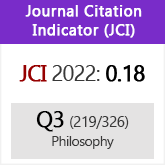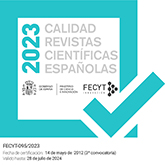La función ideológica del transhumanismo y algunos de sus presupuestos
DOI:
https://doi.org/10.3989/isegoria.2020.063.05Palabras clave:
Transhumanismo, mejoramiento humano, ideología, presupuestos filosóficos, naturaleza humanaResumen
Debemos aprovechar sin duda los beneficios que traen las nuevas tecnologías, y debemos aplicarlas al propio ser humano en la medida en que una reflexión prolongada y serena nos diga que esa aplicación proporciona mejoras en un sentido pleno. Pero eso no implica que debamos aceptar el discurso ideológico del transhumanismo. Este discurso debe buena parte de su poder de convicción a ciertos presupuestos filosóficos que no han sido suficientemente explicitados y discutidos. El presente trabajo pretende poner de relieve algunos de ellos.
Descargas
Citas
Agar, N. (2010), Humanity's End. Why We Should Reject Radical Enhancement, Cambridge, MA: The MIT Press.
Agar, N. (2014), Truly Human Enhancement. A Philosophical Defense and Limits, Cambridge, MA: The MIT Press.
Austriaco, B.P.G. (2015), "Human Nature as Normative Concept: Relevance for Health Care", Handbook of the Philosophy of Medicine, Dordrecht: Springer, pp. 1-10.
Bagaric, M. and J. Allan (2006), "The Vacuous Concept of Dignity", Journal of Human Rights, 5, pp. 257-270 https://doi.org/10.1080/14754830600653603
Bostrom, N. (2005), "In Defense of Posthuman Dignity", Bioethics, 19(3), pp. 202-214. https://doi.org/10.1111/j.1467-8519.2005.00437.x PMid:16167401
Bostrom, N. (2016), Superinteligencia: Caminos, peligros, estrategias, Zaragoza: Teell Editorial.
Bostrom, N. y J. Savulescu (eds.) (2017), Mejoramiento humano, Zaragoza: Teell Editorial.
Braidotti, R. (2015), Lo posthumano, Barcelona: Gedisa.
Buchanan, A. (2011), Beyond Humanity?, Oxford: Oxford University Press. Cortina Ramos, A. y M.A. Serra (coords.) (2016), Humanidad infinita: Desafíos éticos de las tecnologías emergentes, Madrid: EIUNSA.
Diéguez, A. (2005), "El determinismo tecnológico: Indicaciones para su interpretación", Argumentos de Razón Técnica, 8, pp. 67-87.
Diéguez, A. (2017a), Transhumanismo. La búsqueda tecnológica del mejoramiento humano, Barcelona: Herder.
Diéguez, A. (2017b), "Concepto fuerte de naturaleza humana y biomejoramiento humano", en J. Sanmartín y R. Gutierrez Lombardo (eds.), Técnica y ser humano, México: Centro Lombardo Toledano, pp. 81-99.
Diéguez, A. (2018a), "Antropotécnica y naturaleza humana", en J.M. Díaz Álvarez y J. Lasaga (eds.), La razón y la vida. Escritos en homenaje a Javier San Martín, Madrid: Trotta, pp. 460-470.
Diéguez, A. (2018b), "Los profetas ambiguos", Claves de Razón Práctica, 257, pp. 22-31.
Diéguez, A. (2020), "La apelación a la dignidad en el debate sobre el mejoramiento humano", Cuadernos Hispanoamericanos. 835, pp. 30-47.
Ferry, L. (2017), La revolución transhumanista, Madrid: Alianza.
Fukuyama, F. (2002), El fin del hombre. Consecuencias de la revolución biotecnológica, Barcelona: Ediciones B.
Gemma, G. (2013), "Dignidad: un concepto jurídico inoportuno", Anuario da Facultade de Dereito da Universidade da Coruña, 12, pp. 409-422.
German Ethics Council (2019), Intervening in the Human Germline. Opinion. Executive summary and recommendations, Berlin: German Ethics Council.
Gray, J. (2018), Siete tipos de ateísmo, Madrid: Sexto Piso.
Gyngell, C. (2012), "Enhancing the Species: Genetic Engineering Technologies and Human Persistence", Philosophy of Technology, 25, pp. 495-512. https://doi.org/10.1007/s13347-012-0086-3
Habermas, J. (2002), El futuro de la naturaleza humana. ¿Hacia una eugenesia liberal?, Barcelona: Paidós.
Hansell, G.R. y W. Grassie (eds.) (2011), H± Transhumanism and its critics, Suite, PH: Metanexus Institute.
Harari, J.N. (2016), Homo Deus. Breve historia del porvenir, Barcelona: Debate.
Harris, J. (2007), Enhancing Evolution. The Ethical Case for Making Better People, Princeton: Princeton University Press.
Hauskeller, M. (2013), Better Humans? Understanding the Enhancement Project, Durham: Acumen.
Hauskeller, M. (2016), Mythologies of transhumanism, London: Palgrave Macmillan.
Hottois, G. (2016), ¿El transhumanismo es un humanismo?, traducción José Vicente Bonilla Pardo, Bogotá: Universidad El Bosque.
Jasanoff, S. (2016), The Ethics of Invention. Technology and the Human Future, New York: Norton & Co.
Kitcher, P. (2001), Science, Truth and Democracy. Oxford: Oxford University Press.
Kitcher, P. (2011), Science in a Democratic Society. Nueva York: Prometheus Books.
Kurzweil, R. (2012), La singularidad está cerca. Cuando los humanos trascendamos la biología, Berlín: Lola Books.
Lander, E. et al. (2019), "Adopt a moratorium on heritable genome editing", Nature, 267, 13 March, pp. 165-168. https://doi.org/10.1038/d41586-019-00726-5 PMid:30867611
Lewens, T. (2015), The Biological Foundations of Bioethics, Oxford: Oxford University Press.
Llano Alonso, F. (2018), Homo excelsior. Los límites ético-jurídicos del transhumanismo, Valencia: Tirant lo Blanch.
Loza Niño, M. (2018), Contra el Transhumanismo, Bogotá: Litografía Rosmet.
Macintosh, K.L. (2018), Enhanced Beings. Human Germline Modification and the Law, Cambridge: Cambridge University Press.
Macklin, R. (2003), "Dignity is a Useless Concept", BMJ, 327, pp. 1419-1420. https://doi.org/10.1136/bmj.327.7429.1419 PMid:14684633 PMCid:PMC300789
Marcos, A. (2018), "Bases filosóficas para una crítica al transhumanismo", ArtefacToS. Revista de estudios de la ciencia y la tecnología, 7(2), pp. 107-125. https://doi.org/10.14201/art201872107125
Moravec, H. (1988), Mind Children: The Future of Robot and Human Intelligence, Cambridge. MA, Harvard University Press.
More, M. & N. Vita-More (eds.) (2013), The transhumanist reader: classical and contemporary essays on the science, technology, and philosophy of the human future, Malden, MA: John Wiley & Sons, Inc.
Moya, A. (2011), Naturaleza y futuro del hombre, Madrid: Síntesis.
O'Connell, M. (2019), Cómo ser una máquina, Madrid: Capitán Swing.
Persson, I. & J. Savulescu (2012), Unfit for the Future, Oxford: Oxford University Press.
Raposo, V.L. (2019), "Gene Editing, the Mystic Threat to Human Dignity", Bioethical Inquiry, online first. https://doi.org/10.1007/s11673-019-09906-4 https://doi.org/10.1007/s11673-019-09906-4 PMid:30887186
Rey, O. (2019), Engaño y daño del transhumanismo, Madrid: Editorial Ivat SL.
Savulescu, J. (2012), ¿Decisiones peligrosas?, Madrid: Tecnos.
Venter, C. (2013), Life at the Speed of Light: From the Double Helix to the Dawn of Digital Life, Nueva York: Viking.
VV.AA. (2017), Human Genome Editing: Science, Ethics, and Governance, National Academies of Sciences, Engineering, and Medicine. Washington, DC: The National Academies Press.
VV.AA. (2018), Genome Editing and Human Reproduction: social and ethical issues, London: Nuffield Council on Bioethics.
Weber, B. (2018), "Life", The Stanford Encyclopedia of Philosophy, Edward N. Zalta (ed.), https://plato.stanford.edu/archives/sum2018/entries/life/.
Descargas
Publicado
Cómo citar
Número
Sección
Licencia
Derechos de autor 2020 Consejo Superior de Investigaciones Científicas (CSIC)

Esta obra está bajo una licencia internacional Creative Commons Atribución 4.0.
© CSIC. Los originales publicados en las ediciones impresa y electrónica de esta Revista son propiedad del Consejo Superior de Investigaciones Científicas, siendo necesario citar la procedencia en cualquier reproducción parcial o total.Salvo indicación contraria, todos los contenidos de la edición electrónica se distribuyen bajo una licencia de uso y distribución “Creative Commons Reconocimiento 4.0 Internacional ” (CC BY 4.0). Puede consultar desde aquí la versión informativa y el texto legal de la licencia. Esta circunstancia ha de hacerse constar expresamente de esta forma cuando sea necesario.
No se autoriza el depósito en repositorios, páginas web personales o similares de cualquier otra versión distinta a la publicada por el editor.














